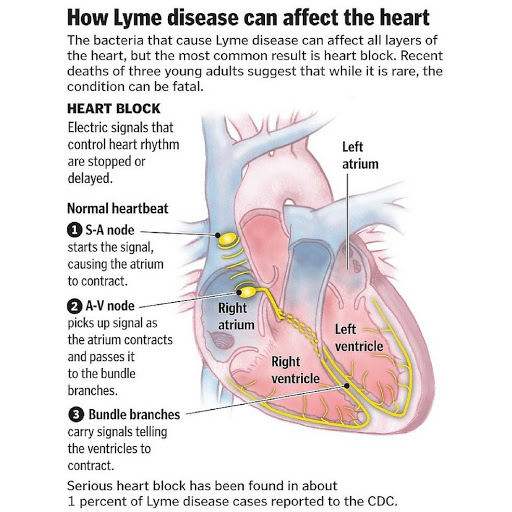One of the biggest health concerns of Lyme disease is the potential for Lyme carditis, which occurs when the Borrelia burgdorferi bacteria enters the tissues of the heart. This infection can interfere with the electrical signals that coordinate the regular beating of the heart. The resulting condition is called “heart block.”
What makes Lyme carditis so dangerous is that even though it is not as common as other conditions associated with Lyme disease, it can be fatal.
What is heart block?
Heart block occurs when the electrical signals that travel through the chambers of your heart are blocked from reaching the ventricles. Depending on where the block is located within the heart, different types of electrical blocks can occur, resulting in different complications and symptoms. This can vary widely from more mild to moderate to severe cases. While many people are aware of the complications and debilitating effects of Lyme disease, few know of the damaging cardiovascular effects of Lyme.
Types of heart block:
(according to UPMC Heart and Vascular Institute)
- First degree (mild): electrical signals are reaching the bottom chambers of the heart at a slower pace
- Second degree (moderate): electrical signals are not fully reaching the bottom chambers of the heart
- Third degree (severe): electrical signs are not reaching the bottom chamber of the heart
Common Symptoms of Lyme Carditis and Heart Block:
- Heart palpitations (feeling as though your heart has skipped a beat or added an extra beat)
- Syncope (temporary loss of consciousness due to lack of blood flow to the brain)
- Chest pain
- Dyspnea (difficulty breathing)
These symptoms usually are seen in conjunction with the more common symptoms of Lyme disease. In fact, it is not uncommon for cardiac symptoms to be asymptomatic (merely a symptom of Lyme and not indicative of any other underlying condition.)
If it is indeed more than that, though, heart block can progress very rapidly. Lyme carditis can even be fatal due to sudden cardiac death, if left untreated.
Know The Three Stages of Lyme Disease
- Localized Lyme disease – The bacteria are just entering the body and have not spread beyond the place of initial contact.
- Early disseminated Lyme disease – Bacteria has moved outside of the initial area of contact and is beginning to spread around the rest of the body.
- Late disseminated Lyme disease – Bacteria has spread throughout the body.
Symptoms of Lyme Disease in Each Stage
The symptoms of Lyme disease may be present from a few days to a few weeks after the initial infection. Lyme disease symptoms are very similar to flu symptoms.
Stage 1 Lyme Disease Symptoms

- General nausea
- Headaches
- Joint pain
- Muscle pain
- Stiff neck
- Chills or fever
- Bullseye rash (known as erythema migrans)
Stage 2 Lyme Disease Symptoms
Stage 2 Lyme disease symptoms may begin to occur a few weeks to a few months after initial exposure. These symptoms may include, but are not limited to:
- Weakness or even paralysis in the facial muscles
- Heart palpitations
- Shortness of breath
- Chest pain
Stage 3 Lyme Disease Symptoms
Stage 3 Lyme disease symptoms may occur months to years after the initial exposure. Joint and muscle pain are common at this stage. Other symptoms may include, but are not limited to:
- Lyme carditis
- Slower cognitive processes
- Speech problems
- Joint swelling
- Tingling
- Numbness
- Muscle weakness
- Abnormal movement in the muscle
Testing for Lyme Carditis
If you suspect you may have Lyme carditis, an ECG should be ordered to confirm heart block. To elaborate, this study suggests these basic investigations should be initiated:
- Laboratory testing
- 12-channel ECG and 24-hour Holter ECG (query: rhythm analysis, PQ interval, QRS width, ectopic beats)
- Chest radiograph (query: heart size, congestion)
- Echocardiography (diameter, ejection fraction, wall motion abnormality, pericardial effusion).
Because many Lyme patients don’t recall a tick bite, it is very important to perform a blood test if you have been involved in high risk activities and are presenting any of the symptoms mentioned earlier.
The blood test that is most often used for Lyme is known as the “ELISA ” test, which is followed up by an immunoblot test. Blood tests may produce a false negative if the disease is in the early stages of development. Even if you are tested for antibodies during an early stage of Lyme disease, the body may not have a high enough production of antibodies for any blood test to detect. However, in places where Lyme disease is known to be a problem, health care providers may be more aware of symptoms in their earliest stages without even having to perform lab tests for the condition.
Other tests that may be used to detect Lyme disease after the bacteria has spread include an MRI, spinal tap, electrocardiogram and echocardiogram.
How is Lyme carditis treated?
Antibiotics are usually prescribed either orally or intravenous (IV). In some cases, a pacemaker may be necessary.
What supplements help the heart?
 While there are many supplements that help with the heart, these are our top picks. (Be sure to consult your doctor before taking any supplements.)
While there are many supplements that help with the heart, these are our top picks. (Be sure to consult your doctor before taking any supplements.)
- L-Carnitine – amino acid that helps improve heart function, reduce angina symptoms, minimize damage post heart attack
- Coenzyme Q 10 – helps with heart failure, energy, enzyme protection of heart muscles
- Garlic – aids in treating high blood pressure and coronary artery disease (added bonus: some research indicates that garlic is helpful in killing Lyme bacteria)
If you suspect you may have Lyme carditis, contact your physician for testing and treatment. Lyme carditis is considered to be rare, but we are seeing an increasing number of Lyme patients report cardiac symptoms. Remember to advocate for yourself and get the testing you need to ensure Lyme bacteria has not entered your heart.
Chronic Lyme affects the entire body. Learn more about the symptoms of Lyme.


